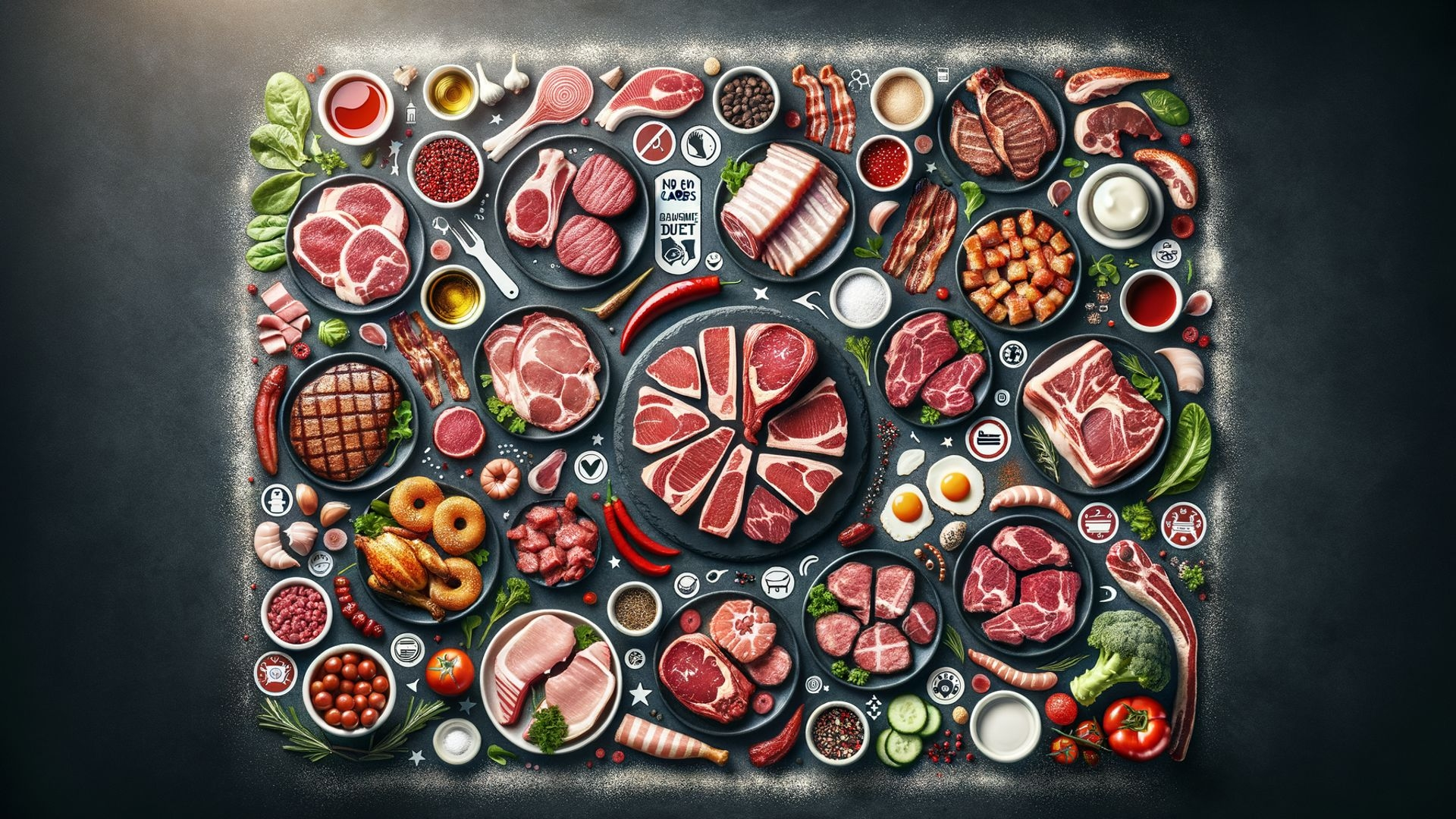Help you lose weight with the Carnivore Diet: Your Essential Food List for Optimizing Metabolism
Embarking on a new diet regimen can often be a daunting task, especially with the myriad of choices available on the market today. One such diet that has gained popularity in recent years is the carnivore diet. This diet is based on the consumption of animal products, excluding plant-based foods and other food groups. In this article, we will delve into the specifics of the carnivore diet, exploring its benefits, potential risks, meal planning, weight management, health claims, improved metabolism, and tips for transitioning to and sustaining this highly restrictive eating pattern.
The Carnivore Diet: What You Need to Know
Understanding the Basics of the Carnivore Diet
The carnivore diet is a dietary approach that involves eating only animal products while excluding plant foods. This means followers of the carnivore diet consume meat, fish, poultry, eggs, and dairy products while eliminating fruits, vegetables, grains, and legumes from their meals. Proponents of this diet believe that by following the carnivore diet, they can improve their health, lose weight, and enhance their overall well-being.
Potential Carnivore Diet Risks
While the carnivore diet can lead to weight loss due to its restrictive nature and low-carb content, it can also pose risks, such as nutritional deficiencies and lack of fiber intake. It is essential for individuals considering the carnivore diet to weigh its benefits against potential health concerns and seek professional guidance before making significant dietary changes. In addition, the long-term effects of following a carnivore diet are not yet well understood, as research on the diet is limited. It is important to consider the potential impact on overall health, including the risk of heart disease and other chronic conditions associated with a high intake of saturated fats and cholesterol from animal products.
Furthermore, the environmental impact of a carnivore diet is significant, as it requires the consumption of a large amount of animal products, which can contribute to deforestation, greenhouse gas emissions, and other environmental concerns. It is essential to consider the ethical implications of consuming a diet that relies heavily on animal products and the impact it has on animal welfare and the planet.
Overall, while the carnivore diet may offer some benefits for weight loss and certain health conditions, it is not suitable for everyone and comes with potential risks and drawbacks. It is crucial to consult with a healthcare provider or registered dietitian before embarking on a carnivore diet to ensure it is safe and appropriate for individual needs and goals. Additionally, considering a more balanced and sustainable approach to eating that includes a variety of nutrient-dense foods from plant and animal sources may be a more sustainable and optimal choice for overall health and well-being.
Important Considerations Before Starting a Carnivore Diet
Before starting the carnivore diet, individuals should carefully consider their current health status, dietary preferences, and fitness goals. Understanding how the diet may impact metabolism, blood sugar levels, and body weight is crucial for successful implementation and adherence. It is also important to consult with a healthcare provider or registered dietitian before making any major changes to your diet, especially if you have existing health conditions or are taking medications. They can help you determine if the carnivore diet is appropriate for you and provide guidance on how to ensure you are meeting your nutritional needs.
Additionally, it is recommended to start slowly and gradually transition to a carnivore diet to allow your body time to adjust. This may involve gradually reducing carbohydrate intake while increasing consumption of animal protein and fats.
It is also important to listen to your body and make adjustments as needed. Some individuals may find that they thrive on a carnivore diet, while others may not feel well or experience negative side effects. Pay attention to how you feel physically, mentally, and emotionally, and make changes accordingly.
In conclusion, before starting the carnivore diet, it is important to do your research, consult with a healthcare provider, and listen to your body to ensure that it is the right choice for you. With proper planning and monitoring, the carnivore diet can be a viable option for those looking to improve their health and achieve their fitness goals.

Carnivore Diet Meal Plan
Carnivore Diet Food List: What to Include and Exclude
Creating a carnivore diet food list involves including animal products such as meat, fish, poultry, and dairy while excluding plant-based foods like fruits, vegetables, grains, and legumes. This highly restrictive diet plan is similar to the keto diet in its focus on animal products and minimal carbohydrates.
Creating a Balanced Meal Plan on a Carnivore Diet
Designing a balanced meal plan on a carnivore diet involves ensuring adequate protein intake, consuming sufficient saturated fat for energy, and managing calorie intake to support weight loss goals. Meal prepping and planning are essential for achieving success on the carnivore diet.
Here is an example of a balanced meal plan on a carnivore diet:
Breakfast:
– Scrambled eggs with bacon
– Steak cooked to your preference
Lunch:
– Grilled chicken thighs
– Side of grilled vegetables (such as zucchini, bell peppers, or asparagus)
Snack:
– Beef jerky or pork rinds
Dinner:
– Grilled salmon
– Side of buttered shrimp or scallops
Snack:
– Cheese or pork cracklings
It’s important to listen to your body and adjust portion sizes as needed to meet your individual nutritional needs. Also, be mindful of your overall calorie intake to support weight loss goals. Don’t forget to stay hydrated with plenty of water and consider incorporating bone broth for additional nutrients.
Meal Prep Tips for Success on the Carnivore Diet
Effective meal prep tips for the carnivore diet include batch cooking animal products, incorporating a variety of cuts and types of meat, and experimenting with different cooking methods to enhance flavor and variety in meals.
1. Batch cook animal products: Prepare a large quantity of meat at once, such as grilling several chicken breasts or cooking a large roast beef, to have on hand throughout the week for quick and easy meals.
2. Incorporate a variety of cuts and types of meat: To avoid getting bored with the same type of meat every day, mix it up by including different cuts like steaks, chops, ground meat, and different types such as chicken, beef, pork, and lamb.
3. Experiment with different cooking methods: Try grilling, baking, broiling, slow cooking, or pan-searing your meat to create different flavors and textures. You can also marinate or season your meat with different herbs, spices, and sauces to keep things interesting.
4. Pre-portion your meals: Divide your cooked meat into individual portions or meal containers to make it easier to grab and go when you’re in a hurry. This can also help with portion control and ensure that you’re getting the right balance of protein in each meal.
5. Freeze extra portions: If you’ve made a large batch of meat and don’t think you’ll eat it all within a few days, portion it out and freeze it for later use. This can help prevent waste and make meal prep even easier on busy days.
6. Don’t forget about side dishes: While the focus of the carnivore diet is on meat, don’t forget to include side dishes like roasted vegetables, salads, or cauliflower rice to round out your meals and add extra nutrients and fiber to your diet.
7. Stay organized: Keep track of what meats you have on hand, what meals you’ve prepped, and when they need to be eaten by. This can help you avoid wasting food and ensure you always have a delicious and nutritious meal ready to go.

Weight Management and the Carnivore Diet Benefits
Losing Weight on the Carnivore Diet: How It Works
Losing weight on the carnivore diet is often attributed to the elimination of high-carb plant foods and the consumption of animal products that promote satiety and fat loss. By following a low-carb, high protein diet, individuals may experience significant weight loss results on the carnivore diet.
Effect of the Carnivore Diet on Metabolism and How it Helps You Lose Weight
The carnivore diet can lead to improvements in metabolism, blood sugar regulation, and body weight due to its emphasis on protein intake, elimination of processed foods, and restriction of carbohydrates. These mechanisms contribute to the diet’s efficacy in promoting weight loss.
Strategies to Enhance Weight Loss Results on a Carnivore Diet
To optimize weight loss on the carnivore diet, individuals can focus on portion control, monitor their caloric intake, prioritize quality animal products, and engage in regular physical activity to support fat loss and body weight management goals.
Some additional tips to optimize weight loss on the carnivore diet include:
1. Choose fatty cuts of meat: Consuming fatty cuts of meat can help keep you feeling satisfied and full for longer, reducing the likelihood of overeating.
2. Incorporate intermittent fasting: Fasting can help enhance fat burning and improve metabolic health, making it a great complement to the carnivore diet for weight loss.
3. Avoid processed meats: Processed meats often contain added sugars, preservatives, and other additives that can hinder weight loss progress. Stick to whole, unprocessed animal products whenever possible.
4. Stay hydrated: Drinking plenty of water can help keep you feeling full and may also boost metabolism, aiding in weight loss efforts.
5. Get enough sleep: Adequate sleep is crucial for maintaining a healthy weight, as lack of sleep can disrupt hormones that regulate appetite and metabolism.
6. Consider individual needs: It’s important to listen to your body and adjust your diet accordingly. Some individuals may need to experiment with different protein and fat ratios to find what works best for their weight loss goals.
It’s important to consult with a healthcare provider or nutritionist before making any significant changes to your diet, especially if you have underlying health conditions or concerns.

Health Claims and Concerns Surrounding the Carnivore Diet
Debunking Common Myths About the Carnivore Diet
Despite its controversial nature, the carnivore diet has been surrounded by various myths and misconceptions. By addressing these misunderstandings and providing evidence-based information, individuals can make informed decisions about the suitability of the diet for their health and wellness goals.
Potential Health Benefits of a Well-Managed Carnivore Diet
A well-managed carnivore diet, when balanced with the necessary nutrients, can offer potential health benefits such as improved gut health, weight management, and support for individuals with certain health conditions like type 2 diabetes. Understanding how to optimize nutrient intake in the carnivore diet is crucial for maximizing its health benefits.
Addressing Nutritional Deficiencies and Health Risks on a Carnivore Diet
To mitigate the risk of nutritional deficiencies and health concerns on the carnivore diet, individuals should focus on sourcing high-quality animal products, consider supplementation where necessary, and monitor their overall well-being through regular health checks and consultations with healthcare professionals.
Transitioning to and Sustaining a Carnivore Diet
Guidelines for Transitioning to a Carnivore Diet Safely
Transitioning to a carnivore diet safely involves gradually reducing plant foods, increasing animal product consumption, and monitoring how the diet affects energy levels, digestion, and overall health. Seeking guidance from a professional nutritionist or dietitian can facilitate a smooth transition to the carnivore diet and through your weight loss journey.
Long-Term Sustainability and Adherence to a Carnivore Diet
Maintaining long-term sustainability on the carnivore diet requires careful meal planning, continuous evaluation of nutritional needs, and adapting the diet to individual preferences and lifestyle factors. By incorporating variety, flexibility, and balance, individuals can sustain the carnivore diet over time without compromising their health.
Seeking Professional Guidance and Support for a Carnivore Diet
For individuals considering the carnivore diet for weight loss or health improvement purposes, seeking professional guidance and support from qualified experts can provide personalized recommendations, address specific concerns, and ensure the safe and effective implementation of the diet. Regular monitoring and adjustment may be necessary to optimize the outcomes of following a carnivore diet.
Does Carnivore Diet Speed Up Metabolism Frequently Asked Questions About
Is the Carnivore Diet Healthy?
While the Carnivore Diet can lead to weight loss and other benefits for some individuals, it is highly restrictive and may not provide all the essential nutrients needed for long-term health.
Will I See Results in Terms of Weight Loss on the Carnivore Diet?
Many individuals report seeing weight loss on the Carnivore Diet, particularly in terms of body fat and water weight reduction.
Carnivore Diet vs Keto?
The carnivore diet relies solely on animal products, excluding all plants, while the ketogenic (keto) diet offers a broader selection, emphasizing low carbs, moderate protein, and high healthy fats.
How Can the Carnivore Diet Help with Fat Burning?
The Carnivore Diet can help with fat burning due to its low-carb and high-protein nature, which can promote metabolic processes that lead to the burning of stored body fat.
Is the Carnivore Diet Suitable for Everyone?
The Carnivore Diet is not suitable for everyone, especially those who require a balanced intake of essential nutrients from a variety of food sources. It’s important to consult with a healthcare provider before starting any restrictive diet plan.
What is a carnivore diet, and how does it relate to metabolism?
A carnivore diet is an eating plan that includes only animal products—meat, fish, eggs, and sometimes dairy—and excludes all plant-based foods. Its claimed by proponents to increase metabolic rate due to its high protein content, which has a higher thermic effect during digestion compared to fats or carbohydrates.
Does the carnivore diet actually speed up metabolism compared to other diets?
There is limited scientific evidence directly linking the carnivore diet specifically to increased metabolism. While a high-protein intake can boost thermogenesis and satiety, leading potentially to a temporary increase in metabolic rate, comprehensive studies on the long-term metabolic effects of the exclusive meat-based diet are lacking.
Can following a carnivore diet lead to sustainable weight loss through increased metabolism?
Any initial weight loss on a carnivore diet may be partly due to water loss and reduced calorie intake rather than an actual increase in basal metabolic rate. Long-term sustainability and health impacts of this diet are not well studied; thus, attributing sustainable weight loss solely to increased metabolism would be speculative without more research.
Are there any risks associated with using a carnivore diet for boosting metabolism?
Yes, there are several potential risks. The lack of fiber from eliminating plant-based foods can lead to digestive issues. The high intake of saturated fat and cholesterol may raise heart disease risk. Additionally, cutting out entire food groups may result in nutrient deficiencies unless carefully managed.
Is there scientific consensus about the benefits of the carnivore diet for metabolism over established dietary guidelines?
No, there is no scientific consensus supporting the superiority of the carnivore diet over balanced dietary patterns recommended by nutrition experts—such as those including fruits, vegetables, whole grains, lean proteins—which are generally considered healthier for long-term metabolic health. Most health authorities advise against highly restrictive diets like the carnivore diet due to potential nutritional imbalances and unknown long-term effects.






